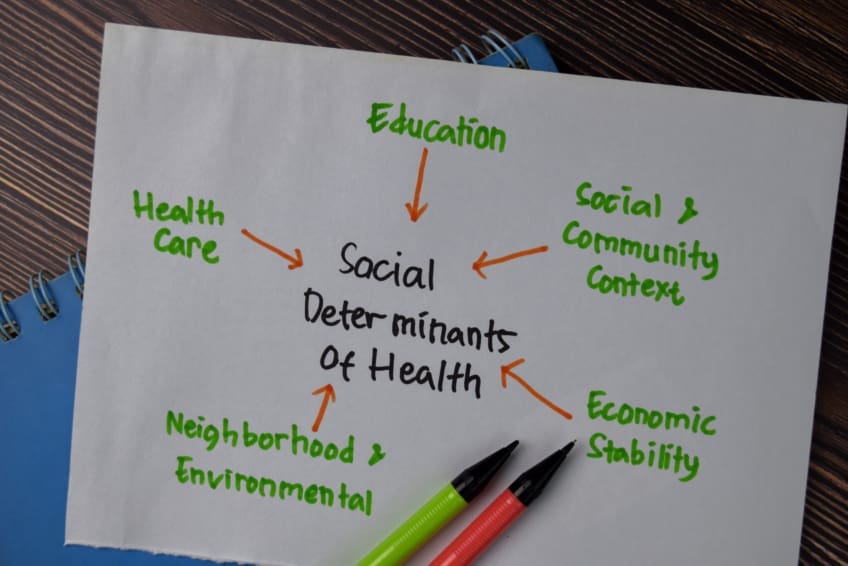

Doctors’ Notes
Real stories by real family physicians
It is important to understand and discuss the non-medical factors that play a role in your short-term and long-term health.
Our health is influenced by a series of elements including biology, access to and quality of medical care, the environment in which we live, work, and play, and individual behaviors. Other factors that can influence your health are educational level and socioeconomic status, as well as your understanding of the medical care you receive. These non-medical factors that impact your well-being are known as social determinants of health.
For almost 15 years, I have worked in a community health center helping the most vulnerable patients navigate their health. Understanding all the components that influence health is essential in helping my patients have the best health outcomes. I believe that improving health literacy, which is the ability to find, understand, and use information and services to inform health-related decisions and actions, is at the foundation of addressing social determinants of health. When you have a better understanding of the factors that impact your health, you can make informed decisions. Additionally, education can help you be an advocate in your own family and community.
Recently, my patient Barbara (not her real name) came into the clinic for a follow-up appointment. We reviewed her labs, discussed her current health conditions, and discovered that her diabetes was not improving. She was on several diabetes medications, which she reported she was taking daily. I wanted to find out if there were any non-medical factors impacting her ability to control her diabetes. We talked about exercise, and she reported she was consistently going to the gym 4 times a week and incorporating both cardio and strength exercises. Next, we discussed her diet. Barbara said she was eating breakfast daily (usually yogurt), eating out for lunch at work, and snacking on granola bars. I then realized the reason why her blood sugars were not controlled: The foods she thought were healthy had hidden sugars and fat. We spent the rest of the visit reviewing how to read a food label and check ingredients in foods.
During another patient visit, I was talking with Susan (not her real name) about how to reduce sodium in her diet to help control her blood pressure. Susan told me she eats whatever she can get. After further conversation, I realized she had limited access to food. This recognition allowed me to help her locate food pantries near her home. We also discussed how to choose healthy options at the food pantry.
Addressing social determinants of health is essential. As a physician, I need to know what is impacting my patients’ abilities to manage their medical conditions and stay healthy. This goes beyond asking if they are taking their medications and involves a deeper knowledge of their lives. Can they afford the co-pay for the medication? Do they understand the medication instructions? Do they know why they are taking medications? Additionally, I need to know if there are outside factors impacting their health. I may want them to exercise, but maybe there are no safe spaces in their neighborhood to walk or ride a bike. They may live in an area with limited access to nutritious foods. They may have unstable housing or other responsibilities that impact how they care for themselves and their health. They may have increased stress or trouble sleeping, making it difficult to control their medical condition. All these things can impact health and, as a physician, I need to understand these factors, screen for them, and help patients address them in ways that improve their health.
While screening questionnaires are common at clinic visits, I prefer to simply get to know my patients and understand their lives outside of the clinic. It is my job to help them navigate their health around the barriers they may face. Honest conversations and screening tools for social determinants of health are critical in helping me connect my patients with resources in their communities that provide relief.
Quick tip
At your next clinic visit, don’t hesitate to discuss the non-medical factors influencing your health. You should feel empowered and not ashamed to talk with your doctors about your circumstances and behaviors, even if they might be contributing to your medical conditions.
This note was developed as part of an unrestricted grant from the Takeda EveryONE Project.
![]()
Copyright © American Academy of Family Physicians
Esta información proporciona una visión general y puede que no se aplique a todos. Hable con su médico de familia para averiguar si esta información se aplica a usted y para obtener más información sobre este tema.








